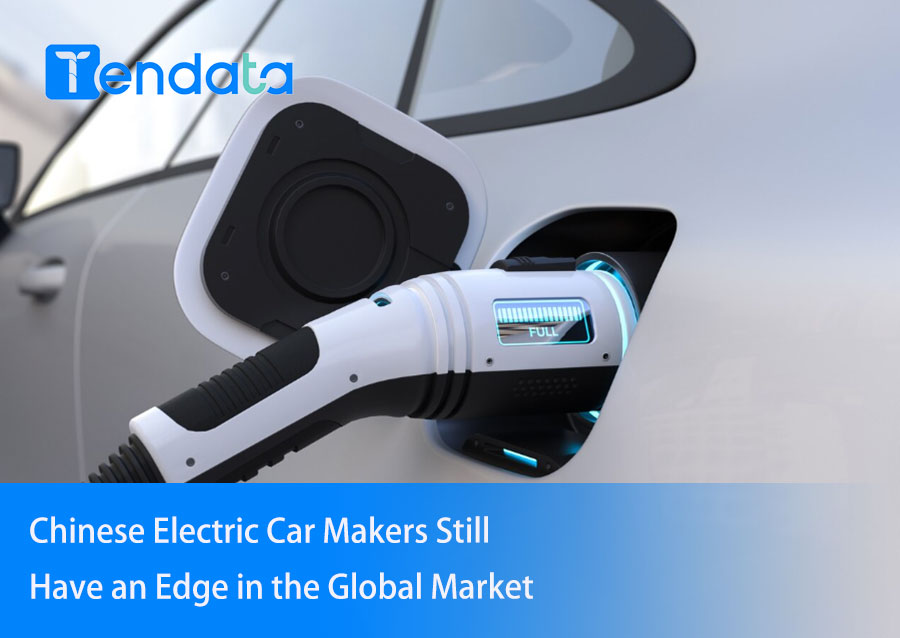 Trade Trends News
Trade Trends News
 26-12-2023
26-12-2023
· Overseas sales of Chinese-branded all-electric vehicles exceeded 130,000 units in the third quarter, a four-fold increase from the same quarter in 2022.
· China holds 58% of the global pure electric vehicle market, ahead of the U.S. at 12%, according to market research firm Counterpoint.

Despite policy hurdles in the European Union and the United States, Chinese pure electric vehicle (BEV) makers are becoming increasingly competitive in the global marketplace as the country's automakers shift their focus to exports amid slowing domestic sales in the world's second-largest economy.
Exports remained strong in the third quarter of this year, with Chinese brands selling more than 130,000 BEVs overseas, a fourfold increase from the same quarter in 2022, according to market research firm Counterpoint.
Chinese EV maker BYD has now caught up with market leader Tesla, accounting for 17 percent of global passenger EV sales in the third quarter, up from 13 percent a year ago, and Counterpoint expects BYD to overtake Tesla as the world's best-selling EV brand in the fourth quarter.
"The influx of low-cost pure electric vehicles from China has had a negative impact on European domestic automakers," said Jeff Fieldhack, research director at Counterpoint. "This highlights the growing competitiveness of the pure electric vehicle market and is expected to intensify further."
To counter China's influence in the Western automotive market, Europe and the U.S. are expected to make significant investments to secure access to the essential minerals needed to manufacture EV batteries, increase the affordability of their pure EVs and reduce their dependence on China, Suman said. Mandal, Counterpoint Senior Analyst.
China's exports of all-electric vehicles were strong in the third quarter, despite sluggish domestic sales, according to Counterpoint, which showed that domestic sales of all-electric vehicles rose just 11 percent year-over-year in the third quarter, below the global average of 29 percent.
According to Mandal, China has a 58 percent share of the global EV market, ahead of the United States (about 12 percent).
He expects global pure electric vehicle sales to reach nearly 10 million units annually by 2023.
Faced with increasing price competition in China's fast-growing but crowded auto market, a growing number of Chinese EV makers are turning overseas, with leaders Xiaopeng, BYD and Zero Run expanding their footprints in markets like Europe, the world's second-largest market for EVs after China.
In October, China's electric vehicle exports to the European Union (EU), which include pure electric vehicles and plug-in hybrids, topped $2 billion for the first time, up 30 percent from the same month in 2022, according to Chinese customs data last month .
In September, the EU launched an investigation into Chinese-made electric cars, accusing Beijing of providing state subsidies to automakers to help keep prices low. China condemned the EU investigation, calling it "pure protectionism".
The U.S. government's Inflation Reduction Act, introduced in 2022, also focuses on localizing the electric vehicle manufacturing supply chain to reduce reliance on China, although it allows some electric vehicles and battery minerals from China to qualify for tax credits.
Chinese EV makers are expected to maintain their dominance in the EU market despite investigations into alleged state subsidies, with sales growing 30% to 35% in 2024, said Wu Bohua, an analyst at Cheung Kong Securities, in a report Tuesday.
Domestically, mainland China's EV sales, including plug-in hybrids, will grow 20 percent by 2024, lower than the expected 30 percent year-on-year growth in 2023, ratings agency Fitch said last month.
"The [Chinese] EV market will continue to grow, but increased competition may force major players to offer discounts to attract buyers, which will affect their profitability," said Ivan Li, fund manager at Loyal Wealth Management in Shanghai.
"In addition, the uncertain economic outlook is putting pressure on millions of Chinese consumers, discouraging them from making decisions to buy big-ticket items."
Category
Leave Message for Demo Request or Questions


 T-info
T-info T-discovery
T-discovery

 My
Tendata
My
Tendata Market Analysis
Market Analysis Customer
Development
Customer
Development Competitor
Monitoring
Competitor
Monitoring Customer Relationship
Customer Relationship






































































































































